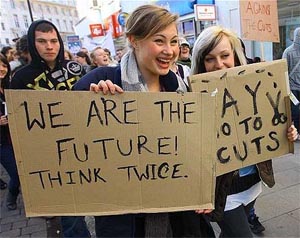By Shrii Prabhat Rainjan Sarkar
 The younger generation usually has greater knowledge than the older generation of how circumstances will change in the future, because it is their nature to look ahead, and consequently they focus more attention on the future than their elders. I am not referring here to adolescent sentimentality, but to how far an understanding of the present momentum can help to prepare for the future. The sentimentality of adolescents and very young adults is nothing but impetuosity. This impetuosity itself does not help in determining future policies. Nevertheless I cannot deny that those who are impetuous understand the nature of this impetuosity better than anybody else. This also gives them a greater right than anybody else to determine policies. How much can those who lie inert like a lump of clay understand of the significance of this impetuosity?
The younger generation usually has greater knowledge than the older generation of how circumstances will change in the future, because it is their nature to look ahead, and consequently they focus more attention on the future than their elders. I am not referring here to adolescent sentimentality, but to how far an understanding of the present momentum can help to prepare for the future. The sentimentality of adolescents and very young adults is nothing but impetuosity. This impetuosity itself does not help in determining future policies. Nevertheless I cannot deny that those who are impetuous understand the nature of this impetuosity better than anybody else. This also gives them a greater right than anybody else to determine policies. How much can those who lie inert like a lump of clay understand of the significance of this impetuosity?
When the main aim is to keep formulating policies for social progress, experience cannot be the sole prerequisite for this work. Rather a combination of the past experiences of the older generation and the creative zeal of the young should determine the speed of social progress. We cannot afford to neglect either group. The human race must attain glory by giving due recognition and justice to all.
A society whose leaders have a strong tendency to denigrate others will suffer a great catastrophe. The tendency to look down upon others does not always result from a superiority complex. Many people treat others with contempt to hide their own ignorance. The superiority complex is harmful to society, and this treating others with contempt to hide one’s ignorance is even more harmful. Everyone, irrespective of their education, intellectual attainment, external appearance, internal qualities, social status or age, must remember that those whom they consider inferior know more about many things than they do.
Although I have said this before, I will say it again: seventy-five per cent of the evils in society are the result of the injustices that people commit against each other.
Excerpted from Human Society 1 (1959), "Social Justice". Copyright Ananda Marga Publications 2013
